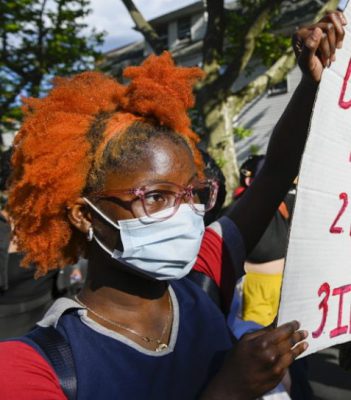A Parish Open To All – Bridging the Racial Gap
PEP Newsletter
Ideas For Your Parish
 __________________________________________________________________________ July, 2020
__________________________________________________________________________ July, 2020
Confronting White Privilege
The world-wide outpouring for solidarity around “Black Lives Matter” following the killing of George Floyd could be a tipping point for a change in attitudes and actions by white people towards People of Color. Local churches and parishes could play a significant role in keeping this momentum for greater racial equality moving forward.
What Can White People Do
Fr. Bryan Massingale, an ethicist at Fordham University, has written a powerful reflection in the June 12-25, 2020 issue of the National Catholic Reporter on the current racial justice activism in our country. It is entitled, “The Assumptions of White Privilege and What We Can Do About It.” He guides the readers to a deeper understanding of a troubling reality, especially for many white Catholics, and includes several practical action steps for individuals and faith communities. These include sitting with discomfort, admitting the need for further education, confronting family and friends, being unconditionally pro-life, and praying. (https://www.ncronline.org/news/opinion/assumptions-white-privilege-and-what-we-can-do-about-it)
A Parish Case Study
Consider a pastor who took these words to heart and did something about it. “I need to allow this awareness to go deep into my soul,” he reflected. “What person of color could I find to lead me through this?” He found a Black woman, a Unitarian pastor, to be his mentor. For eight days in a row he met with her and listened to her stories of racial intimidation and fear. Then he prayed that he would be open to a new understanding of himself. When the week concluded he was ready for the next step.
First, his homilies included an acknowledgement of his white privilege and power. Next, he called the parish staff together for a Zoom session. He shared his retreat experience and asked them to reflect on their own areas of white privilege, how this influenced their attitudes, actions and ways of ministering. They agreed to do this soul-searching he requested. What he prayed for became a reality; the staff “got it.” As one member shared, “I feel we are no longer the same staff we once were. It seems as though there has been another virus in our midst, one hidden deep inside that has now shown itself.”
A Blue Ribbon Commission
With the staff’s support, the pastor called the pastoral council together for a virtual meeting. He recounted his own retreat experience and the staff’s desire to move forward. “What is happening in our country,” he began, “is a rare opportunity, a moment of grace. I propose that we gather a group of picked individuals to lead us toward a new reality as a parish, one open to greater racial equality. Let’s face it, we are a white community with all of the hidden benefits this includes. What I ask of you, as the council, is to give this new commission the authority to make decisions and an adequate budget to carry out its mission. Will you take this risk, uncertain and uncomfortable as this may seem?” Much discussion followed but in the end they agreed to give it a try, but limit it to only a six month trial period.
This new commission began by mapping out action steps. These included inviting a Black pastor to preach at the Masses and answer questions afterwards, an outdoor social to which a local Black congregation be invited to attend, offering videos and other materials for online reading, a monthly speaker series with small group discussions, new banners and decorations in the church. Parishioners would also be given suggestions about how to talk with family and friends regarding racial issues. These plans all pointed to a parish more open and accepting of all, no matter the person’s culture or background.


